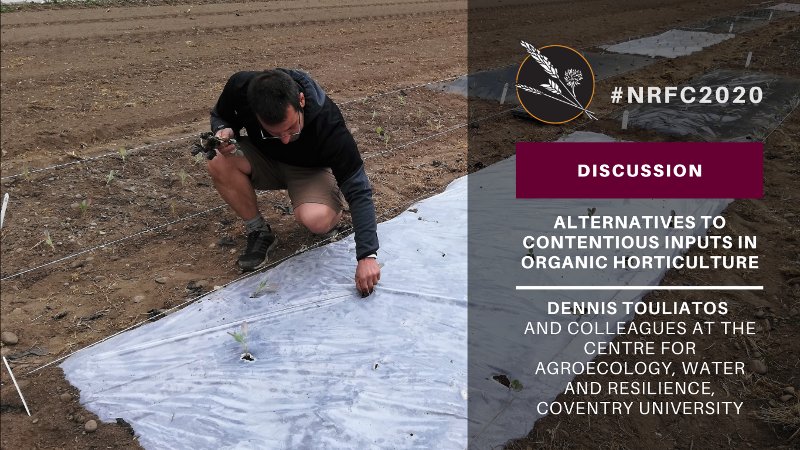On Tuesday 6th October, researchers from Coventry University’sCentre for Agroecology, Water and Resilience led the NRFC session, “Alternatives to contentious inputs in organic horticulture“. As part of the EU H2020 project Organic-PLUS, they are investigating alternatives to materials that whilst permitted in organically certified systems have significant downsides.
The session focussed on soil-related contentious inputs, specifically: plastic mulch, peat growing media and animal manure from non-organic farms. Around 20 growers attended and brought with them a range of experience and opinions. After an introduction to the project, participants split into groups for more detailed discussion.
It was found that most people shared the project’s concerns but had other worries, in particular, the overall use of plastic in horticulture (not just mulch): plastic packaging (food and growing media sacks), fleece and netting, pots and modules. Many growers are already using alternative materials including cardboard and wood chip as mulch and plant derived fertility sources including comfrey – there was a strong appetite for more research around such alternatives. Although, there are always time limitations, the group were broadly in favour of ‘systems-solutions’, where alternative materials could be sourced on-farm rather than simply exchanging a contentious input for another brought-in product. Growers would also like more support and collaborative schemes to address these issues collectively. The team at Coventry found the session incredibly informative and helpful to their research; they hope to progress their work with this added insight and collaborate with some of the growers from the conference in the near future.
A summary of the group discussions:
Part 1, Use of contentious inputs and concerns about them:
- participants, overall, were concerned about contentious inputs in organic systems
- growers had experienced contamination of non-organic manure with aminopyralid
- as well as the plastic mulches we are investigating, other plastics are a big concern for people (vegetable packaging, packaging for growing media, fleece, netting, polytunnel coverings, pots and modules)
- some growers had struggled to find good peat-free compost for seeds
- there were concerns around the amount of chicken manure used (welfare, residues, leaching of nitrates)
- it was acknowledged that plastic can be incredibly useful and long-lived plastic items may not be so bad
Part 2, Interest in alternatives, current use of alternatives and barriers:
- the availability of good peat-free growing media has improved but is still not perfect
- some growers had experienced success with cardboard mulch and suggested it would be good to have a scheme linking growers to excess/waste packaging materials
- public awareness is biased towards the side of production that consumers actually see, e.g. plastic packaging rather than plastic mulch
- unawareness among the general public of horticultural practices – they do not know why materials like plastic mulch are used (IE why weeds are such a problem to crops)
- we identified a need to have a local approach to the use of resources, e.g. some people can obtain fallen leaves whilst others cannot
- time was a limiting factor in utilising on-farm solutions (could potentially be ameliorated by effective collaborations, particularly locally)
- many growers use green waste compost but had concerns about plastic and pesticide contamination
- some growers are already using comfrey and nettle
- a large proportion of participants were either using woodchip or were excited about it and wanted to know more as it is available to them
Part 3, On-farm solutions and alternatives needing further investigation:
- it was felt that on-farm solutions tend to work better on a small scale
- farm scale may also influence whether an alternative will actually work or is available in sufficient quantities
- what works for one grower/site/climate/crop/soil may not work for another
- on-farm solutions are more likely to be trialled by smaller producers, whereas larger farms operated by employees are less likely to experiment
- there was interest in using humanure – more research needed around removing harmful residues, hormones etc.
- it was suggested that there should be a system of certification for animal manure
- it was identified that there is a need to see alternativeness being effective at scale and for this to be communicated to other growers
- people wanted more definitive information on the use of coffee grounds and brewers’ waste
- more research around using various kinds of wood chip (different species, different chip size, ramiel etc.)
You will be able to watch the recording of the session here.

